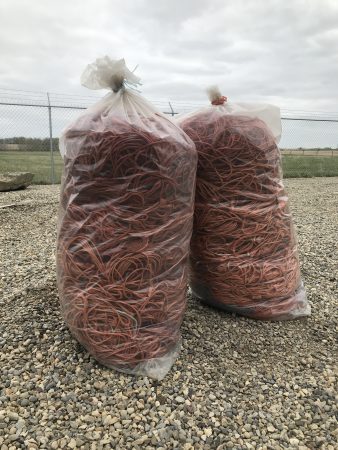
Cleanfarms launches Sask. pilot to collect baler twine for recycling
by CM Staff

Part of Cleanfarms' zero plastic waste strategy for farms

Plastic twine is commonly used in farm operations to bind hay, straw and silage for storage, but at the end of its useful life, twine is challenging to manage. This Cleanfarms pilot aims to develop a stable recycling program for agricultural twine. – Cleanfarms photo (CNW Group/CleanFARMS Inc.)
MOOSE JAW, Sask. — Cleanfarms has launched a pilot program in Saskatchewan to collect baler twine for recycling.
Baler twine wraps and stores hay, straw and silage, but at the end of its life, plastic twine is challenging to manage. Disposal in landfill can result in the twine twisting around the wheels of landfill equipment and disposal by burning or burying is detrimental to the environment. In Saskatchewan alone, an estimated 1,100 to 1,300 tonnes of twine are used in farm operations.
“Beyond collecting empty grain bags for recycling, the next most important item for us to focus on is twine. Getting it out of landfill and burn piles and into recycling bags has been a Cleanfarms goal for the past few years,” said Cleanfarms Executive Director Barry Friesen in a prepared statement.
He said that this Saskatchewan pilot — which will involve more than 30 collection locations — will lay the groundwork for permanent programs for twine and other agricultural plastic wastes that will be implemented in farm communities throughout Canada.
“Saskatchewan farmers’ participation in this program will help us understand how to create a circular economy for the recovery of twine once farmers are finished with it,” Friesen said.
He pointed to the Cleanfarms program, ‘Building a Zero-Plastic Waste Strategy for Agriculture”, which is partially funded by Agriculture and Agri-Food Canada’s Canadian Agricultural Strategic Priorities Program (CASPP) as the catalyst that has made this pilot possible.
Already underway is the grower survey component which is targeted for completion in December. The survey asks growers about current practices and attitudes toward disposal options for various types of agricultural plastic waste generated in their operations. The results will inform the development of additional pilot projects that will be conducted throughout the agriculture sector.